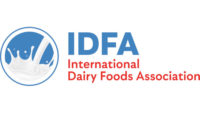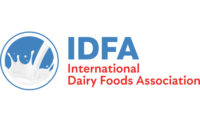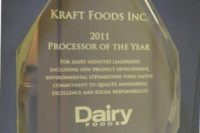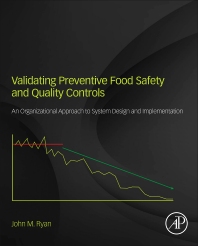Cornell team receives IDFA’s first food safety award at 2017 Dairy Forum
Also at the 2017 Dairy Forum, Kathleen Glass received the NCI Laureate Award and Connie Tipton is honored with a Soaring Eagle award for service to the association.

Ron Dunford presents the National Cheese Institute Laureate award to Kathleen Glass.

From left: Michael Dykes, IDFA president and CEO; Alise Sjostrom and Maggie Jennissen of Redhead Creamery; Linda and Jerry Jennissen, owners of Jer-Lindy Farms LLC; and Lucas Lentsch, CEO of Midwest Dairy Association, who nominated the farm for the award.

From left: John Allan, IDFA vice president of regulatory affairs and international standards; Martin Wiedmann, Gellert family professor in food safety; Anika D. Zuber, regional dairy processing and marketing specialist; and Samuel D. Alcaine, assistant professor of dairy fermentations.
The Cornell University Dairy Foods Extension team received the International Dairy Foods Association’s inaugural Food Safety Leadership Award at the 2017 Dairy Forum in Orlando, Fla. The annual event, staged by IDFA, was held Jan. 29 to Feb. 1.
At the same awards luncheon, held on Jan. 30, IDFA’s National Cheese Institute bestowed its highest honor, the NCI Laureate Award, on Kathleen Glass, a senior scientist and associate director at the Food Research Institute of the University of Wisconsin-Madison.
The 2017 Innovative Dairy Farmer of the Year was Jer-Lindy Farms LLC of Brooten, Minn. IDFA and Dairy Herd Management magazine co-sponsor the award, which recognizes U.S. dairy producers that apply creativity, excellence and forward thinking to achieve greater on-farm productivity and improved milk marketing.
Former IDFA President and CEO Connie Tipton was honored with the association’s Soaring Eagle award for her service. Also at the luncheon, Dairy Foods presented its 2016 Dairy Processor of the Year award to Mike Wells, president of Wells Enterprises. (See the December 2016 issue.)
Cornell’s comprehensive approach
The Food Safety Leadership Award honors an individual, group or organization for demonstrating outstanding leadership directed at enhancing food safety within the dairy products industry. Cornell’s team was selected for its comprehensive and innovative approaches to support and improve food safety across the dairy industry, as well as its drive to share cutting-edge research conducted by its world-renowned scientists with the global dairy industry.
The members of the team are: Samuel D. Alcaine, assistant professor of dairy fermentations; David M. Barbano, professor and director of the Northeast Dairy Foods Research Center; Carmela Beliciu, dairy extension specialist; Kimberly R. Bukowski, program director; Louise Felker, program coordinator; Nicole Martin, associate director, Milk Quality Improvement Program; Carl Moody, regional dairy processing and marketing specialist; Steven C. Murphy, senior extension associate; Robert D. Ralyea, senior extension associate; Martin Wiedmann, Gellert family professor in food safety; and Anika D. Zuber, regional dairy processing and marketing specialist.
“The program’s multidiscipline approach makes it an international leader in dairy food safety,” said John Allan, IDFA vice president of regulatory affairs and international standards. “The Dairy Foods Extension team goes beyond the lab to offer its expertise both on campus and off. IDFA is honored to award the Cornell Dairy Foods Extension team for leading the way for dairy food safety on so many fronts.”
“We are honored to see our team at Cornell recognized and grateful that IDFA and their members have established this new award, which highlights the importance of food safety for the dairy industry and the achievements and efforts of this industry in food safety,” said Martin Wiedmann, the project manager, who accompanied Zuber and Alcaine to accept the award on behalf of the team.
Cornell University offers innovative training programs, onsite support to dairy companies and a pilot plant to allow small and start-up dairy companies to learn how to produce products safely.
Glass solves pathogen problems
The NCI Laureate Award recognizes individuals who have made significant contributions to the development and growth of the cheese industry. A panel of industry professionals chooses a winner each year based on the person’s long-term contributions to the industry.
In presenting the award to Glass, Ron Dunford of Schreiber Foods Inc. (who serves as NCI Chairman) said “Her research focuses on improving food safety by eliminating or controlling the growth of pathogenic bacteria. The findings of her work have influenced changes to the Pasteurized Milk Ordinance and are used by product developers and food safety professionals in the cheese and broader dairy industries.”
Glass has been globally recognized for her work on Clostridium botulinum, Escherichia coli 0157:H7 and Listeria monocytogenes in relation to dairy and other ready-to-eat food products. She has designed and conducted numerous complex studies to resolve dairy industry problems dealing with a variety of foodborne pathogens.
Her expertise in designing and conducting challenge studies has made her one of the most respected experts in this area in the United States and abroad. Her research on inhibiting C. botulinum in shelf-stable pasteurized process cheese and related products received worldwide recognition. It served as the basis for developing the Better Process Cheese School at the University of Wisconsin Food Research Institute, as well as IDFA’s Better Process Cheese School.
Looking for a reprint of this article?
From high-res PDFs to custom plaques, order your copy today!






